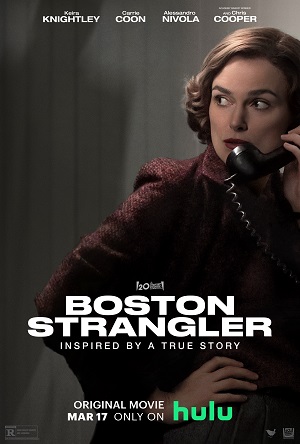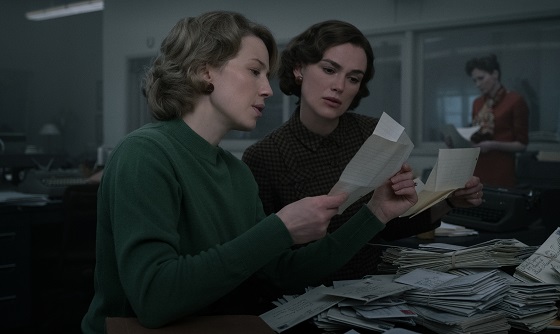

[Rating: Minor Rock Fist Up]
Streaming on Hulu Friday, March 17
An interesting story trapped in a movie that never quite figures out how to do it justice, Boston Strangler accomplishes all of its goals with flair and pizazz to spare. A shoe leather investigative reporting flick with a surprising number of twists and turns for a true story with a robust and up-to-date wiki page, the film never manages to fully channel the built-in tension and drama of its subject. And while the leads and supporting cast pull their fair share of the project’s weight, the sum of the various parts never quite elevate the picture to the place these efforts would suggest is possible.
Following a brief cold-open flash-forward, Boston Strangler settles on aspiring journalist Loretta McLaughlin (Keira Knightly), who is stuck on the Lifestyle desk at the Boston Record American newspaper in 1962. Loretta discovers what she believes is a link between several recent murders, and must actually plead with her boss, Jack (Chris Cooper), to do some follow up work on the story to develop the leads. Loretta’s reporting ruffles the feathers of the Boston PD, whose public stance on the matter is that the homicides are unrelated: a move that comes back to bite them in the ass when Loretta’s connections appear confirmed during subsequent killings.
Sensing the scope and importance of the story, as well as the novelty of having women reporting on a serial killer targeting women, Jack pairs Loretta up with experienced reporter Jean Cole (Carrie Coon) to go deep on what they eventually dub “The Boston Strangler.” Jean’s police connections and experience digging for leads smooths over Loretta’s initially ruffled feathers, and the pair quickly discover that they make a good team. Yet what begins as a journalistic endeavor to scoop their rivals turns into a real-time investigation of the killings that unquestionably influences the outcome of the case.

The story is a good one, both on the surface and beneath, but writer/director Matt Ruskin struggles with the focus of Boston Strangler, allowing it to take equal turns as a newspaper drama, a treatise on sexism, and a serial killer thriller. All three storylines rely on each other to tell a complete tale, yet none of these narrative threads surrender the main focus to the others, which leaves the movie with three A-plots fighting against their own momentum from act to act. It’s a question of balance, and one the film never quite figures out despite several different layers of very compelling and interesting ideas.
On the face of it, this thing seems to write itself, as it is a factual reimagining of a familiar story whose particulars are chiseled into the pop culture and shared history lexicon. When people tell the tale of the killing spree that terrorized Boston in the early-60s, they focus on the cops and the killer; often ignoring the integral role Loretta and Jean played in making the initial connections and pressuring the local law enforcement agencies to collaborate. Boston Strangler shines a light on this oft overlooked component of real-life events, and even takes it a step further to examine the work they did after Albert DeSalvo (David Dastmalchian) confessed.
Had this been the dominant narrative voice of the picture, Ruskin might have really been cruising, but too often Boston Strangler pauses to present a cliched picture of marital strife that is both muddled and hackneyed. Loretta’s husband, James (Morgan Spector), starts off as a compassionate, progressive figure that supports his wife’s professional ambitions, only to then turn on a dime to rail against his spouse’s increasingly frequent absences (it often feels like he’s been copy/pasted in from a different version of the script). The movie also swerves out of its primary narrative lane to portray a few of the killings, which all feel like they belong in a different film and serve no purpose in the story after the first such vignette.

Even so, there’s enough interesting and innovative stuff here to warrant a watch, even for those not particularly interested in serial killer lore. There’s a method to the seeming madness of Ruskin’s split focus on all three components of this story, one that comes into focus after a third-act twist lifts the curtain on everything. It doesn’t spoil anything to say that the reveal does indeed land, and is fascinating, even if the path to get there is sometimes jagged and uneven.
Knightly and Coon are outstanding in the lead roles, though the writing sometimes lets them down (the former in particular). Both sell their struggles as women trying to navigate a man’s world well, and bristle with what seems like the appropriate amount of angst afforded to the brave ladies of this era. That said, the other roles aren’t as well defined. The chief culprit in this regard is Jack, who is some kind of editor or boss to Loretta and Jean, though in what capacity is never quite clear: especially in relation to another boss-like character at the paper: Eddie (Robert John Burke).
Tense, engaging, well cast, and only sometimes bewildering, Boston Strangler is a welcome update to the eponymous serial killer’s legend, one that rightfully puts the spotlight back on the women partially responsible for bringing justice to the victims. Lacking in narrative or visual flair (the color scheme is as depressing as the ultimate resolution), yet with enough material and acting heft to execute on a gripping story, the film should satisfy (if not dazzle) historians, sleuths, and casual passers-by alike.





Comments on this entry are closed.